Completed evaluations
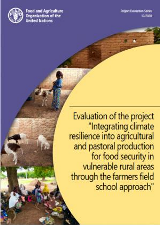
Evaluation of the project "Integrating climate resilience into agricultural and pastoral production for food security in vulnerable rural areas through the farmers field school approach"
18/12/2020
The project, implemented by FAO from May 2015 to August 2020, aimed to “enhance the capacity of Burkina Faso’s agricultural and pastoral sectors to cope with climate change, by mainstreaming climate change adaptation (CCA) practices and strategies into on-going agricultural development initiatives and agricultural policies and programming and upscaling of farmers adoption of CCA technologies and practices through a network of already established farmer field schools (FFS)”.
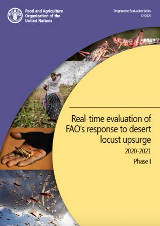
Real-time evaluation of FAO’s response to desert locust upsurge 2020–2021: Phase I
14/12/2020
Over the course of 2020, the most devastating Desert Locust upsurge of the past 25 years spread across parts of the Middle East, the greater Horn of Africa, and southwest Asia. The upsurge posed an unprecedented risk to livelihoods and food security in some of the most food insecure countries in the world.
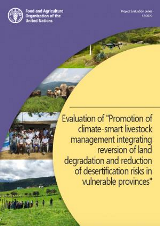
Evaluation of "Promotion of climate-smart livestock management integrating reversion of land degradation and reduction of desertification risks in vulnerable provinces"
14/12/2020
From May 2020 to October 2020, FAO implemented the project to “reduce soil degradation, and mitigate greenhouse gas (GHG) emissions in the livestock sector of Ecuador”. The project was implemented seven provinces, distributed in three geographic regions of the country (coastal Ecuador, the Andes and Amazon).
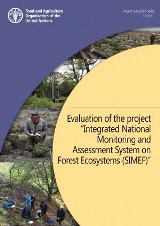
Evaluation of the project "Integrated national monitoring and assessment system on forest ecosystems (SIMEF)"
03/12/2020
From August 2015 to May 2020, FAO implemented the project in order "to develop and implement an integrated monitoring and assessment system on carbon stocks and biodiversity in forest ecosystems (SIMEF) supporting the National Greenhouse Gases Inventory (INGEI) and the design of policies, regulations and SFM practices incorporating the REDD+ Programme and biodiversity conservation in forest ecosystems".
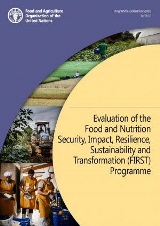
Evaluation of the Food and Nutrition Security, Impact, Resilience, Sustainability and Transformation (FIRST) Programme
23/10/2020
The FIRST Programme aims to support the governments of targeted countries to strengthen the enabling policy and institutional environment for food and nutrition security and sustainable agriculture (FNSSA). The programme is designed as a demand-based “policy assistance” facility which has its roots in the long-term partnership between FAO and the European Union and aims to add value to both partners’ actions at the country level.
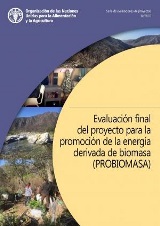
Final evaluation of the project for the promotion of biomass-derived energy (PROBIOMASA)
23/10/2020
The Project for the promotion of energy derived from biomass (PROBIOMASA) seeks to increase the supply of renewable and competitive energy through the production of energy derived from biomass at the local level. [Spanish only]
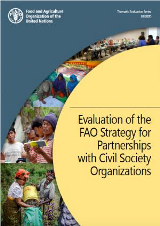
Evaluation of the FAO Strategy for Partnerships with Civil Society Organizations
22/10/2020
The Strategy for Partnerships with Civil Society Organizations, endorsed in 2013, has reiterated FAO’s commitment for collaboration with civil society organizations. Since then, FAO has further promoted civil society’s active participation in global policy discussions, regional and national consultations, and international forums, resulting in several formal partnerships agreements being signed.
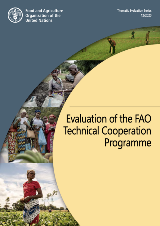
Evaluation of the FAO Technical Cooperation Programme
19/10/2020
This evaluation is a comprehensive assessment of FAO’s Technical Cooperation Programme (TCP) to evaluate its relevance, effectiveness and efficiency, fund allocation and distribution, governance and management, in addition to strategic and programmatic aspects. OED undertook the evaluation between March and September 2020.
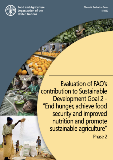
Evaluation of FAO’s contribution to SDG 2 - End hunger, achieve food security and improved nutrition and promote sustainable agriculture
16/10/2020
The SDG 2 Evaluation will adopt a formative lens to assess FAO’s past and present work on SDG 2-related areas to identify good practices that should be expanded, areas for improvement, and potential gaps that need to be filled; understand FAO’s positioning and its comparative strengths and weaknesses on SDG 2, and opportunities for strengthening its delivery; and explore the best options going forward to strengthen FAO’s approach, partnerships and programmes in support of SDG 2.
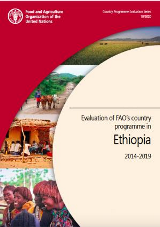
Evaluation of FAO’s country programme in Ethiopia 2014-2019
07/10/2020
The evaluation of FAO’s country programme in Ethiopia will take stock of the results achieved so far, strengthen the relevance and effectiveness of FAO’s interventions in the country, and contribute to the formulation of the next country programming framework for Ethiopia.
